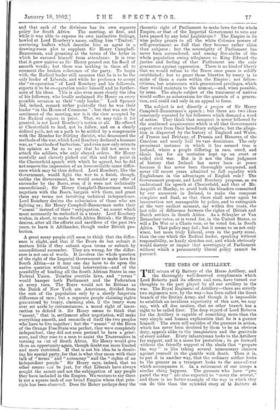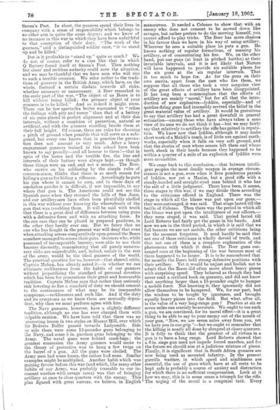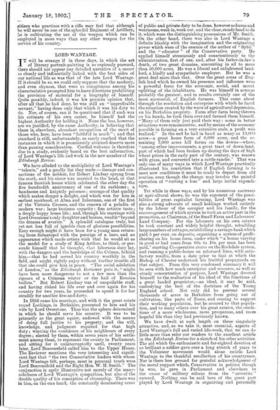THE USES OF ARTILLERY. T HE return of Q Battery of
the Horse Artillery, and the thoroughly well-deserved compliments which Lord Roberts paid its officers and men, have turned our thoughts to the part played by all our artillery in the war. The Royal Regiment of Artillery—there are strictly two regiments now, by the way—has been called the finest branch of the British Army, and though it is impossible to establish an invidious superiority of this sort, we may say, with all due caution, that no other branch has a. right to be called finer. The deep regard of Lord Roberts for the Artillery is capable of something more than the very simple and human explanation that he is a gunner himself. . The stern self-sacrifice of the gunners in action, which has never been doubted by them to be an obvious duty, appeals alike to the imagination and the gratitude of every soldier. Every infantryman looks to the Artillery for support, and in a sense for protection' to go forward without- the friendly support of the shells that "prepare the way" is' like taking several unnecessary chances against yourself in the gamble with death. Thus it is, to put it in another way, That the ordinary soldier looks to the gunner as a. transport looks to the man-of-war which accompanies it. In a retirement of our troops a similar thing happens. The gunners who have "pre- pared the way" are also expected to "cover the retreat," and there is no better example of the way in which they can do this than the splendid storY of Q Battery at Sanna's Post. In short, the gunners spend their lives in company with a sense of responsibility which belongs to no other arm in quite the same degree ; and we blow of no instance in this war in which they have been unfaithful to that conception of their duty. "The work of the gunners," said a distinguished soldier once, "is to stand up and be killed."
But is it profitable to "stand up" quite so much ? We do not, of course, refer to a case like • that in which Q Battery found itself at Sanna's Post. Then nothing but sheer and reckless audacity could save the situation, and we may be thankful that we have men who will rise to such a terrible occasion. We refer rather to the tradi- tions of gunnery in the British Army, which have, on the whole, fostered a certain disdain towards all risks, whether necessary or unnecessary. A Boer remarked in the early part of the war, "The object of us Boers is to kill without being killed ; the primary object of your gunners is to be killed." And so indeed it might seem. There can be 'few spectacles better warranted to "refine the feelings with pity and terror" than that of a battery of six guns placed in perfect alignment and at their due intervals, without a suspicion of protection, natural or artificial, and with the gunners standing beside them at their full height. Of course, there are rules for choosing a pitch of ground when possible that will serve as a safe- guard, but every one knows that in practice the precau- tion does not amount to very much. After a heavy engagement gunners trained in this school have been known to say proudly—and all honour to them !—that in spite of the losses and the terrible fire, the line and intervals of their battery were always kept,—as though these things were an end, and not a means. The Boer, who carries on his soldiering by the simple rules of common-sense, thinks that there is as much reason for hiding 'a gun as for hiding a rifleman. Accordingly he puts his gun where it cannot be seen, and in these days of smokeless powder it is difficult, if not impossible, to say where that gun is. The Americans could not see the Spanish guns when they stormed the hills of San Juan, and our artillerymen have often been plentifully shelled in this war without ever knowing the whereabouts of the gun that was, troubling, them. It will be said with truth that there is a great deal of difference between using guns with a defensive force and with an attacking force. In the one case they can be placed in prepared positions, in the other they hardly ever can. But we fancy that no one who has fought in the present war will deny that even when attacking across comparatively open ground the Boers somehow managed to screen their guns. Gunners who, while possessed of incomparable bravery, were able to use their bravery discreetly, remembering that all purely unneces- sary risks are•unprofitable, and, indeed, unfair to the rest of the army, would be the ideal gunners of the world. The practical question for us, however—that shrewd critic, Captain Mahan, has already. asked it—is whether we can eliminate recklessness from the habits of our gunners without jeopardising the standard of personal devotion which has been for generations their great and honourable tradition. Captain Mahan says that rather than seriously risk lowering so fine a standard of duty we should consent to the continuance of what may be its inseparable symptoms,—recklessness and such like. And if the duty and its symptoms as we know them are mutually depen- dent, why then we must perforce agree with him.
The Navy gunners, however, have a slightly different tradition, although no one has ever charged them with culpable caution. We have been told that there was an Interesting lesson in two styles on Hussar Hill, over which Kr Redvers Buller passed towards Ladysmith. Side by side there were some 12-pounder guns belonging to the Navy, and. some 5 in. garrison guns belonging to the Army. The naval guns were behind sand-bags ; the greatest concession the Army gunners would make to the theory of protection was to hang a few twigs on the barrel of a gun. All the guns were shelled. The Army men had some losses, the sailors had none. Similar examples might be multiplied. Another habit which was gaining favour before _this war (and which, like many other habits of our Army, was probably traceable to our in- cessant warfare with savage races) was that of bringing artillery at once to close quarters with the enemy. This plan figured with great success, we believe, in English manceuvres. It needed a Colenso to show that with an enemy who does not consent to be mowed down like savages, but rather prefers to do the mowing himself, you cannot afford to play tricks. The Boer has more chances in his favour than we have in his way of using artillery. Wherever he sees a suitable place he puts a gun. He knows nothing of regular formations, of massing his artillery, or of concentrating his fire. We, on the other hand, put our guns (at least in pitched battles) at their invariable intervals, and it is not likely that Nature will have happened to provide six suitable places for the six guns at the six regular intervals. That is too much to hope for. As for the guns on, their own merits, apart from the men who fire them, we suppose that all, those who took a very sanguine view of the great effects of artillery have been disappointed. It has long been a commonplace that the effects of artillery are mainly "moral," but for all that the intro- duction of new explosives—lyddite, especially—and of quick.-er-firing guns had insensibly revived the belief in the great material value of artillery. It would be gratuitous to say that artillery has had a great downfall in general estimation—among those who have always taken a sane view of its uses we do not think it has—but we may fairly say that relatively to artillery the rifle has gained in reputa- tion. We know now that lyddite, although it may make short work of a Mahdi's tomb, is of little use against earth- works, especially when it falls on very soft ground, and that the stories of men whose senses left them and whose teeth shook in their heads because they happened to be within a quarter of a mile of an explosion of lyddite were mere moonshine.
We come back to this conclusion,—that between intelli- gent peoples the most deadly weapon in average circum- stances is not a gun, even when it fires ponderous parcels of lyddite, nor yet a Maxim, but a good rifle with a steady-handed and straight-eyed man behind it who has the salt of a little judgment. There have been, it seems, three stages in this war, if we may divide them according to the criticisms offered in England. There was the stage in which all the blame was put upon our guns,— they were outranged, it was said. That stage lasted till the battle of Colenso. Then there was the period in which all the blame was put upon the intelligence of our officers,— they were stupid, it was said. That period lasted till Lord Roberts had fairly got the game in his hands. And now we are in the third period, in which it is said that we fail because we are not mobile, the other criticisms being for the moment forgotten. It need hardly be said that not one of these criticisms is wholly devoid of truth, and that not one of them is a complete explanation of the phenomena with which it deals. The Boer guns out- ranged ours at the beginning of the war because most of them happened to be larger. It is to be remembered that for months the Boers held strong defensive positions with their artillery. Yet it would be unjust and foolish not to admit that the Boers did often move about heavy pieces with surprising speed. They behaved as though they had never read a civilised book on gunnery, and did not know that anything larger than a 15-pounder ought to hamper a mobile force. Not knowing it, they ignorantly did not allow themselves to be hampered. We, for our part, had the wisdom to be taught by ignorance, and brought equally heavy pieces into the field. But what, after all, is the value of a very long-range gun ? Practice at six or seven miles can scarcely be accurate. We ought to use such a gun, we are convinced, for its moral effect—it is a great thing to be able to say to your enemy out of the mouth of your gun, "Now, we, are seven miles away from you, ydt we have you in our grip "—but we ought to remember that the killing is nearly all done by shrapnel at closer quarters. It is folly to think that the greatest of all virtues in a gun is to have a long range. Lord Roberts showed that a Gin, siege gun need not impede forced marches, and for the future we should aim at ajudicious mixture of pieces. Finally, it is significant that in South Africa gunners are now being used as mounted infantry. In the present guerilla. warfare, in which speed and nimbleness are essential, the use of guns which have at all costs to be kept, safe is probably a source of anxiety and distraction for which there is no sufficient compensation. Look at it how we may, this is in some sense a triumph for the rifle. The urging of the moral is a congenial task. Every citizen who practises with a rifle may feel that although he will never be one of the splendid Regiment of Artillery, be is cultivating the use of the weapon which can be employed in more ways than any other weapon for the service of his country.








































 Previous page
Previous page